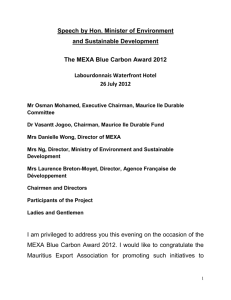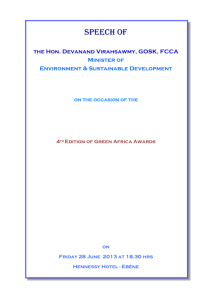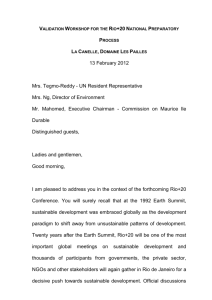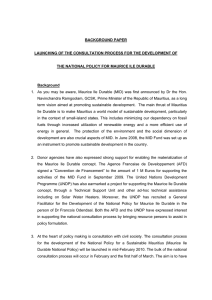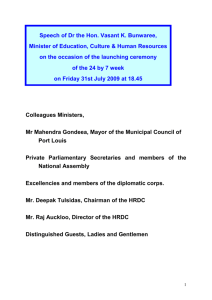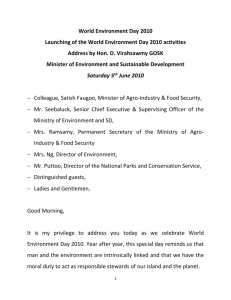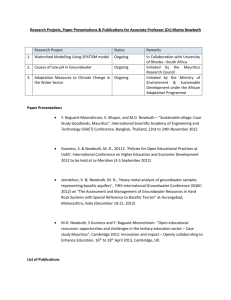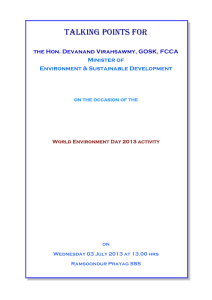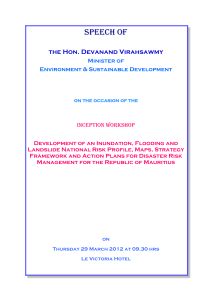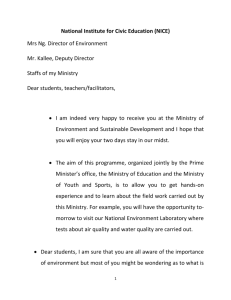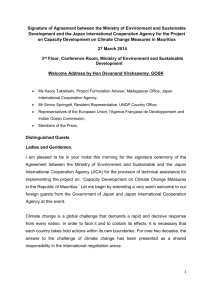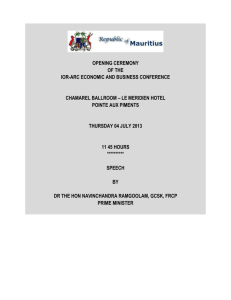12.03.14 Principles of Land Use
advertisement
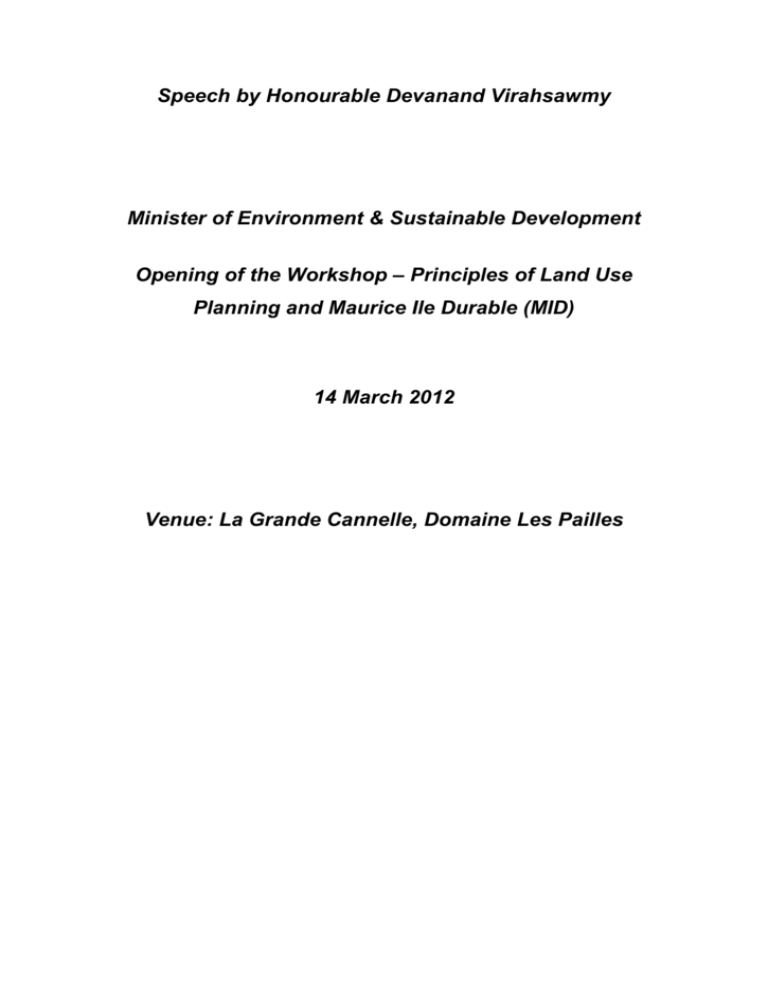
Speech by Honourable Devanand Virahsawmy Minister of Environment & Sustainable Development Opening of the Workshop – Principles of Land Use Planning and Maurice Ile Durable (MID) 14 March 2012 Venue: La Grande Cannelle, Domaine Les Pailles Dr. the Honourable Abu Twalib Kasenally, Minister of Housing and Lands Mr Osman Mohamed, Executive Chairman of the Commission on MID Mr Abdool Nooranee Ozeer, Permanent Secretary of the Ministry of Housing and Lands Mr Premhans Jhugroo, Permanent Secretary of the Ministry of Environment & Sustainable Development. Distinguished Guests, Dear Participants Ladies and Gentlemen, It is a great pleasure for me to be in your midst today for the opening of the workshop on the “principles of Land Use Planning and Maurice Ile Durable.” I wish first of all, to congratulate the Ministry of Housing and Lands for this laudable initiative in organizing this workshop in the context of the National Day 2012 Celebrations, the theme of which is Maurice Ile Durable. Mauritius, like all small island developing states, has limited land resources. It is known that during the past few decades, the demand for land for various types of development has increased considerably. It is therefore imperative that we manage our scarce land resources judiciously to promote sustainable development, especially in view of the looming global food crisis and the ever-increasing risks of land degradation by floods and droughts due to climate change. Over the years, much of the useable land in Mauritius has been put to productive use and the extent of vacant lands available for developmental projects today is relatively limited. The National Development Strategy 2003 did forecast that over the next 20 years up to 15,000 hectares of land could be released from the agricultural sector to meet the projected housing needs for community development as well as for social amenities. This will considerably increase the pressure on the high quality agricultural land and also on the remaining forestland while exacerbating the ecological and land degradation impacts, if necessary precautions are not taken. Ladies and Gentlemen, The Ministry of Environment and Sustainable Development has always expressed growing concern on the increasing incidence of land degradation observed throughout Mauritius. The first National Environmental Action Plan for Mauritius prepared in 1988 identified sustainable land management as one of the major environmental issues confronting our country. The 1993 National Physical Development Plan, prepared as part of the first Environment Investment Programme provided a strong basis for integrating land planning in our development strategy. Internal policies for land use in Mauritius have also been guided by the Environmental Protection Act, which provides for development control mechanisms. Most important of all, the 2003 National Development Strategy which has identified priorities to underpin sustainable development. As a densely populated small island, we have to face pressure for land use. If we fail in our land use policy and planning, all our efforts towards environmental protection will be absolutely pointless. That is why we need to strike the right balance between development and protection of our environmental assets in our development strategy. My Ministry is thus placing much emphasis on sustainable land management. In this context, we have started implementing various recommendations made under the frameworks for (i) Integrated Coastal Zone Management, (ICZM), (ii) Environmentally Sensitive Areas (ESA) As such, the ICZM framework would ensure management of our coastal zone in an integrated and sustainable manner, allowing the optimal use of our coastal and marine resources while preserving its integrity and making it resilient to the impacts of climate change. The ESA framework would on the other hand, allow for the preservation and sustainable use of sensitive areas which includes our mountains, caves, beaches, lagoons, coral reefs, wetlands, mangroves, rivers, surfaces as well as underground water, islets and forests, amongst others. Let me point out that the Environmental Impact Assessment and Preliminary Environmental Report licensing mechanisms are the most important tools for monitoring sustainable land management. We also have other mechanisms such as Post EIA monitoring and enforcement of the various provisions of the Environmental Protection Act to ensure that any development is carried out in harmony with environment. All these mechanisms would be reinforced through a review of the Environment Protection Act, which is presently underway. The changes in the legislation would make it more responsive to the emerging challenges of our new economic paradigm and help move steadily in the path of sustainable development. At the global level, Mauritius has signed and ratified a number of conventions, which are of relevance to sustainable land management. The most relevant ones include the United Nations Convention to Combat Desertification, the United Nations Framework Convention on Climate Change, the United Nations Convention on Biological Diversity and the Ramsar Conventions on Wetlands. We are thus fully committed in adhering to these Conventions. Ladies and Gentlemen, There is an urgent need for adopting integrated cross-sectoral approaches to foster sustainable land management. Lessons learned from past experience underline the need to revisit our institutional and legislative frameworks in order to foster adequate enforcement of policies and legislation with a view to ensure coherence with sustainable land management principles and requirements. As a matter of fact, we need to rethink our development model to remain on the sustainable pathway. As such we require to adjust and consider a deep transformation of our environmental, economic and social landscape, in line with the vision of the Prime Minister for a “Maurice Ile Durable”. My Ministry is therefore in the process of developing a proper framework by translating the MID Vision into a concrete policy through a Ten Year Strategy together with a first Three Year Action Plan. Mott MacDonald Ltd (UK), which is a well known British consultancy firm, has been awarded the contract for the preparation of the Ten Year Strategy and the 3 Year Action Plan. Work by the Consultants has started in February following a visit to Mauritius by the Team Leader and the Sustainability Specialist of the project. The MID Policy and Strategy Document is expected to be finalised by the end of May 2012, whereas the Action Plan would be ready by the end of July 2012. Relevant Ministries and stakeholders would thus have the opportunity to have their own priority projects included in the Action Plan. Sustainable land Management will be given due consideration in this process. Ladies and Gentlemen, We all have one common goal: that Mauritius be recognized and cited as a model of sustainable development all over the world. To move towards Maurice Ile Durable, there is need for ownership and commitment. It is therefore imperative to have the active collaboration and effective participation of Ministries and Stakeholders concerned for a coordinated approach towards sustainable land management. The ultimate objective is to work together as one team and one nation, to forge ahead and achieve our goal of a “Maurice Ile Durable”. I am convinced that this workshop will inspire collaboration and dialogue among various stakeholders present. With these words I wish you all fruitful deliberations during the workshop. I thank you all for your attention. D.V.
